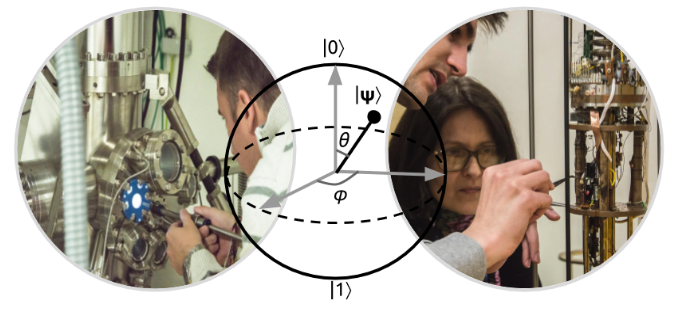iQUTE (Virtual Research Institute for Quantum Technologies)
iQUTE are scientific research activities of the Slovak National Center for Quantum Technologies QUTE.sk.
Goal: To create a virtual institute of quantum technologies iQUTE, which will bring together individual research teams and guarantee the sustainability of excellent research.
Research groups:
- Research Center for Quantum Information (IP SAS)
- Department of Experimental Physics (Comenius Univesity, FMPH)
- Centre of Low Temperature Physics (IEP SAS)
- Ústav fyzikálnych vied (UPJŠ)
- Ústav informatiky (UPJŠ)
- Department of Physics and Technology at Nanoscale (IEE SAS)
- Mathematical Institute SAS
- Oddelenie bezpečnosti informačných systémov (UIM FEI STU)
Research objectives:
-
Theory of quantum information structures.
Research in quantum information structures identifies the basic theoretical framework for quantum technologies, i.e., creates concepts and methods that allow us to define quantum technologies, determine the fundamental theoretical and practical limits of their functionality, and finally certify their implementations. - Quantum bit implementations.
Hybrid superconductor or semiconductor systems are promising candidates for quantum bits. We intend to participate in the research of theoretical models for “quantum dots” in silicon and molecular nanomagnets, which have two significant properties for quantum computing:- their properties can be customized by molecular engineering while remaining almost unchanged in their placement on a substrate;
- due to the stronger interaction between electron spins, the operating time of quantum gates (on the order of nanoseconds) may be significantly shorter than the “lifetime” of such quantum bits (on the order of microseconds).
-
Quantum simulations and computational complexity.
The development of state-of-the-art simulation methods for large quantum mechanical systems and their application in solid-state physics and quantum chemistry. Quantum simulations are an area where the most significant applications of medium-sized and slightly noisy quantum chips developed in the near future are expected. This intention includes the design of new algorithms to study properties of quantum phases (topological arrangements) for the analysis of hyperbolic geometries of spacetime (quantum theory of gravity), fractal structures, and multidimensional quantum states of particles. Since simulations are inherently challenging, the second goal of this intent is to understand the computational complexity of simulation and optimization tasks that occur in industrial applications (chip transistor layout design, image recognition) and solid-state physics (finding the lowest energy states, understanding correlations). The result will be not only basic research at the border of theoretical computer science and quantum physics but also practical, more efficient optimization algorithms that make full use of available quantum resources (coupling, superposition, tunneling). - Quantum and postquantum communication networks.
Quantum communication infrastructure is mainly a research infrastructure, and its construction and optimization are the subject not only of engineering but also of experimental and theoretical research. As part of this plan, we will focus on experimental testing of various alternatives and approaches, a new protocol for implementation-safe quantum communication, secure distribution of cryptographic keys (interconnected quantum states), and the development of efficient and unconditionally secure post-quantum (asymmetric) cryptography. The question of a safe combination of standard symmetric and post-quantum asymmetric cryptography with quantum key distribution and the use of combined protocols will also be interesting. —

The iQUTE institute covers research activities of the interested partners and performs expert and popularization activities. iQUTE’s research is focused on basic research of qualitatively new quantum-IT structures, certification, and optimization of quantum technologies, development of efficient algorithms for quantum systems simulations, analysis of computational complexity of physical systems, and design of secure communication protocols. The key strategic goals of the iQUTE platform are focused on theoretical modeling and experimental development of quantum hardware in superconductor and semiconductor systems, implementation of quantum detectors, quantum memory, and quantum “repeater” for the needs of the global quantum network (quantum internet).
